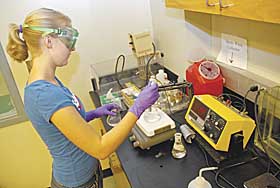  |
| HOME | THIS ISSUE | CALENDAR | GRANTS | BACK ISSUES | < BACK | NEXT > |
Research Experience Helps Hook Undergrads On Science CareersBy Elizabeth Omara-Otunnu - July 18, 2005 |
||||
|
If it weren’t for a summer research program he attended here six years ago, graduate student Jason Durand probably wouldn’t be at UConn now. When Durand was an undergraduate, he spent a summer in the lab of chemistry professor Harry Frank, setting up a laser system to study carotenoid molecules extracted from spinach, as part of the Research Experience for Undergraduates program funded by the National Science Foundation. “Participating in the REU gave me a taste of what it would be like to work in a lab all the time,” says Durand, who was a student at Rhode Island College at the time. “The REU had a huge impact on my career choice,” he adds. “I’m not sure I would have applied to graduate school had it not been for my experience in the program.” This summer, about 30 undergraduate students from institutions around the country and from UConn are immersing themselves in research with science, math, and engineering faculty at the University of Connecticut. The University has five such research clusters, including three NSF-funded REU sites – in chemistry, polymer science, and electrical and computer engineering – and two others in pharmaceutical science and math.
A National Need “There is a perceived need for the U.S. to develop people with skills in sciences,” says Amy Howell, an associate professor of chemistry who heads the site in chemistry. Eric Donkor, an associate professor of electrical and computer engineering and director of the engineering REU site, says the shortage of scientists and engineers with graduate degrees is hurting the economy. “More students are stopping their education at the bachelor’s degree level and going into the workforce,” he says. “The technological aspect of the economy is suffering.” Students from around the country compete to take part in the programs, and those selected are highly qualified, says Donkor. This year, the electrical and computer engineering REU site received more than 30 applications for eight summer slots, and the chemistry site, now in its eighth year, selected 13 participants from about 200 applications. The University hopes the program will help attract top students to do graduate studies here. During the past three years, the chemistry department recruited five graduate students out of about 40 participants in its REU site. Recruiting women and minorities is also a goal of the REU program. The chemistry site has been particularly successful in recruiting female students: about 60 percent of the participants during the eight years of the program have been women.
Learning Curve “The basic objective is not to break new ground, but to take them through the research process, from writing a proposal, investigating, verifying, reporting findings, to disseminating their work,” says Donkor. This summer, REU participants at UConn are expected to give oral and poster presentations, and write a scientific paper for publication in The Journal of Young Investigators, an online peer-reviewed undergraduate science journal. One of the spring 2006 issues will be devoted exclusively to papers by participants in UConn’s REU programs this year.
Jamie Stull, an undergraduate from Fort Lewis College in Colorado working with Frank this summer, says the most difficult thing about doing research is that “things move very slowly, and 10 weeks is not very long.” Howell says that although what the students can get done during a single summer is limited, the experience gives them an understanding of the nature of research: “By doing research, students start to understand that sometimes it’s the unexpected that’s the most interesting thing, and that science consists of failure as well as success.” Kinetsu Abe, a mathematics professor and director of a new undergraduate research site in math funded by the Provost’s Office, worked through that issue with a student who asked how to solve a problem in computational topology and geometry. He offered a few hints, then turned the problem back to the student. “Frustration is part of research,” he says. “There isn’t necessarily a right way. The students have to look for their own solution. That process is very important. Research is a new type of learning experience.” A number of the participants do get a taste of success, however. Some have authored or co-authored articles in major professional journals, others have attended professional conferences as co-presenters. Robin Bogner, an associate professor of pharmaceutical sciences who has run a program of summer research fellowships for undergraduates funded by pharmaceutical companies for the past 10 years, says undergraduates bring a new perspective to ongoing research projects. “These students come in fresh, not having looked at this research area before,” she says. “Every summer student has made a contribution – sometimes huge contributions – to the way we continue after they leave.” Having a number of undergraduate research sites on campus simultaneously enables the programs to offer joint seminars and workshops on practical aspects of scientific research such as ethical issues, how to give effective presentations, scientific writing, and how to choose a graduate school.
Career Preparation “This is good preparation for graduate school,” says David Lovit, a math major who is going into his senior year at Swarthmore College. Lovit is one of four students working with math professor Joseph McKenna on a project using differential equations to explain the motion of a spring and a cable when random force is applied. Lovit says he’d rather spend his summer working on math problems than sunning himself someplace. “There’s not as much going on at the beach,” he says. |
| ADVANCE HOME UCONN HOME |

